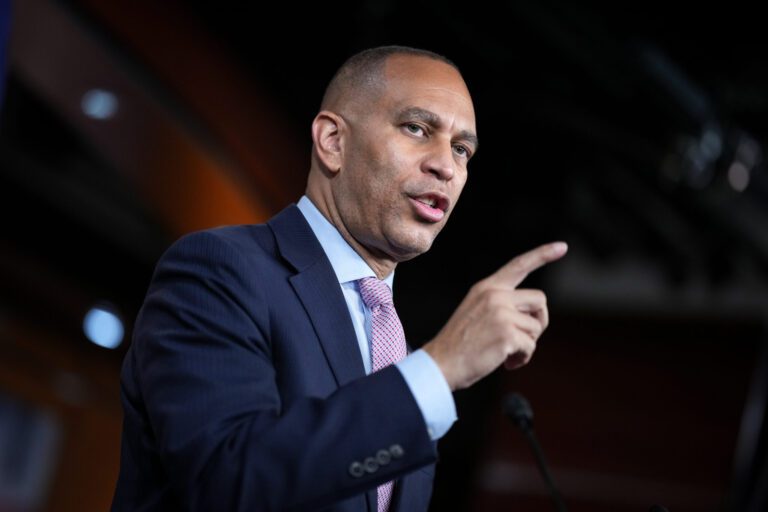Hakeem Jeffries Urges Urgent Action on Affordable Care Act Subsidies Ahead of Meeting with Trump
As House Minority Leader Hakeem Jeffries prepares for his first meeting with President Donald Trump today, he emphasizes the necessity for immediate legislative action regarding the Affordable Care Act (ACA) subsidies. Jeffries asserts that Democrats will not simply accept a handshake agreement; they demand proactive solutions now.
Senate Democrats’ Past Decisions and Current Leverage
Earlier this year, Senate Democrats faced considerable pressure when they chose to pass a funding agreement that disappointed many liberal lawmakers and party activists. This decision has set the stage for the opposition party, led by Jeffries, to leverage their influence to extend health insurance subsidies established during the Biden administration, which are set to expire at the end of this year.
Jeffries Critiques Republican Trustworthiness
In his remarks to the press, Jeffries did not hold back, accusing Republican lawmakers of "lying" about their commitment to health care reform.
"No one can trust their word on health care," said Jeffries. "These individuals have been trying to repeal and displace people off the Affordable Care Act since 2010."
He further indicated that accepting Republican assurances would be unreasonable, stating:
"On behalf of the American people, we’re supposed to simply take their word that they’re willing to negotiate?"
Key Players in the White House Meeting
Joining Jeffries for the meeting with Trump will be Senate leaders John Thune and Chuck Schumer, along with House Speaker Mike Johnson. Their discussions will likely focus on a critical funding agreement aimed at averting a government shutdown on Tuesday.
Details of the Proposed Funding Agreement
The Republicans have put forth a straightforward proposal: a seven-week extension of government funding at current levels. This bill was passed in the House on a party-line vote on September 19, only to be blocked by Senate Democrats on the same day.
Thune explained the rationale behind this move:
"This is a simple, seven-week funding resolution to allow us to do a normal appropriations process," he told Meet the Press. "Something that Democrat senators have said that they want to see done."
Accusations and Miscommunication
Republicans have accused Democrats of threatening a government shutdown over plans to fund health care for illegal immigrants. This narrative has been echoed by Speaker Johnson, Vice President JD Vance, and top White House aide Stephen Miller.
Clarifying the Democratic Position
In contrast, Democrats seek to roll back specific Medicaid reforms implemented by Republicans as part of the One Big Beautiful Bill Act. These reforms restrict federal funding for states that use their own dollars to provide healthcare for non-citizens — a point that Jeffries was keen to clarify:
"Federal law prohibits the expenditure of taxpayer dollars on providing health care to undocumented immigrants. Nowhere have Democrats suggested that we’re interested in changing federal law."
Democrats’ proposals aim to modify some Medicaid provisions without altering the legal restrictions concerning non-citizen healthcare.
Divergence Among Lawmakers
Despite the current divisions, there is some flexibility among lawmakers. In March, ten Senate Democrats voted with Republicans to advance a funding agreement, much to their colleagues’ frustrations. Senator Jeanne Shaheen, one of those Democrats, has indicated she could support a Republican-authored funding bill if it comes to the floor before the critical deadline.
"We ought to be able to keep government open and ensure people can stay on their health insurance," Shaheen stated.
On the other hand, Senator Rand Paul has confirmed he will not support the spending agreement, while Senator John Fetterman is prepared to back whatever proposal the GOP presents. These dynamics mean Thune needs to garner support from at least seven additional Democrats to secure passage before the looming shutdown deadline.
Conclusion
As discussions unfold in the White House, all eyes will be on Jeffries, Trump, and other key legislators to see how this pivotal moment in health care reform plays out. The urgency to extend ACA subsidies and fund the government is a pressing issue that highlights the complexities and challenges within the current political landscape.
For ongoing updates and analyses, visit Health Affairs and Kaiser Family Foundation for comprehensive insights into health policy developments.


